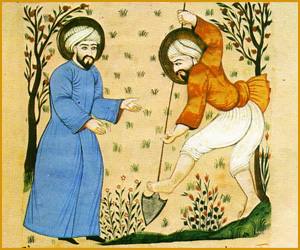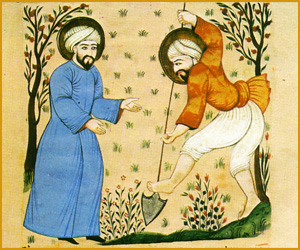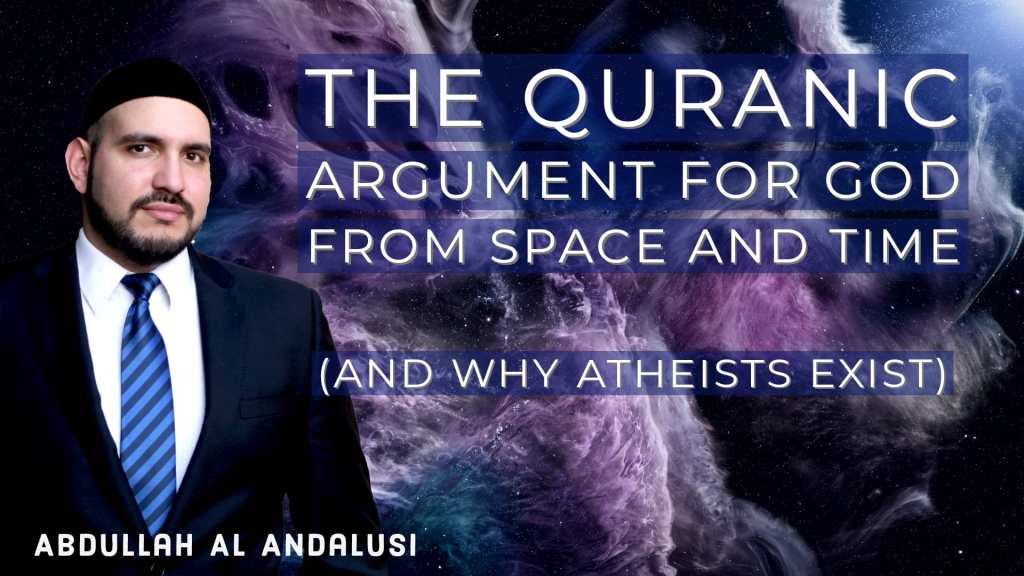One of the common confusions regarding the understanding of Islam in the English language, is namely the use of the Arabic word ‘Kafir’. The problem has arisen because some Muslims and (most) non-Muslims lack understanding of Quranic idiom and confuse and misunderstand how the Quran contains recurring Arabic words that have different meanings in different places despite being the same word. This is called polysemy, and the word Kafir is a polysemic word in its usages (and can have more than one meaning depending on how its used).
Islamophobes like to capitalise on this by falsely accusing Muslims using the word ‘Kafir’ in its legal sense when referring to people who do not call themselves a Muslim, as ‘using derogatory words for non-Muslims’, and when Muslim theologians discuss the punishment for kufaar (plural of Kafir) in the hereafter, Islamophobes ignorantly accuse them of ‘condemning all non-Muslims on earth to hell’.
Additionally, some people who are not Arabic speakers nor educated in the nuances of Quranic Arabic get confused when those self same theologians discuss the punishment for ‘kufaar’ in the afterlife, but also explain in the same breath that merely being currently a ‘non-Muslim’ or ‘non-believer’ doesn’t mean someone will end up in hell. So what’s going on? The confusion lies in lacking an understanding of the Quranic terminology and its use of identical Arabic words to mean different meanings in different sentences.
Arabic Root of the Word Kafir
The word ‘Kafir’ comes from the root ‘KFR’ (to cover, something covered), and the root has 525 cognates in the Quran. The most common cognate of the the root KFR is the word ‘Kufr’, which has the literal meaning ‘to cover’. However, the context of how it is used in the Quran generally determines its meaning, and this is what the this article will attempt to show.
The Quran mostly uses the term Kufr to mean ‘disbelief, a rejection of true belief’ (as in: to ‘cover’ the truth). So for example, the Quran describes polytheism as ‘Kufr’, which means that belief in it, means a rejection of the reality that there is only One God. Of course, a human cannot change reality simply by believing it isn’t what it is, so the Quranic term ‘kufr’, means that a rejector simply covers over the truth from their view.
Conversely, the Quran also uses the cognate of KFR, for the terms Kaffira, or Kaffara, to refer to forgiveness and the removing of sin (Quran 3:193), or expiation of sin (Quran 5:45). This would seem to be connected as a ‘covering’ up of Sin, by God blotting it out (hence removing it), or by means of doing a good deed (hence an expiation of the sin).
The Quranic Uses of the Word Kafir
The word ‘kafir’, and its plural, occurs over 153 times in the Quran. The word literally means in Arabic ‘someone that covers’. Its literal meaning is therefore not ‘disbeliever’, but is used to convey a number of different meanings depending on the context of the Arabic sentence.
The word ‘Kafir’ is used at different times to mean different things in the Quran, here are some examples of its different usages below:
‘Kafir’ used in the literal sense in the Quran
The word Kafir refers to something that covers who physically covers something. This has been used in the Quran to refer to farmers, who cover seeds in the earth when they till (e.g. Quran 57:20).

‘Kafir’ used in the Theological [1] sense in the Quran
The word Kafir can be used in a Theological [1] sense to refer to those who will be judged in the hereafter as disbelievers, who were insincere in their life and deliberately rejected the truth which they covered despite knowing it was true. This also includes those who refused to question what they were taught (i.e. blind followers) and did not search for the truth when they became aware of their beliefs uncertainty. This meaning includes any person guilty of such insincerity whether they label themselves as Muslim or non-Muslim on earth;
‘Kafir’ used in the Political/Legal/Social/Community sense in the Quran
The word Kafir can be used to describe a community, people or background of a person, without being a final theological indictment (of their destination in the afterlife) against them. Here are two examples:
1) Kafir as a generic word for non-believer / unbeliever
This description refers to using the word ‘Kafir’ to mean all ‘non-believers’ in Islamic revelation. This is not the same as the English term ‘disbeliever’, since someone who is not a believer in revelation may be sincere and be willing to challenge their society’s assumptions, and search for and accept the truth if they find it. Since they are not convinced yet or aware of Islam they do not label themselves as Muslim. They may come from a situation or society where the actual truth is unclear, unknown and therefore covered from them. The category is used in Quran 60:5 and tells Muslims of the prayer of Abraham (pbuh) that he did not want to be a trial or torment for those who are non-believers in his message. The verse then goes on to talk about showing kindness and being just to non-believers [Quran 60:8], except those who actively fight and unjustly expel believers from their homes due to their beliefs.
2) Kafir as a word for pagans/polytheists exclusively (and not ‘people of the Book’ i.e. those following Judaism and Christianity)
While the Quran can use ‘Kafir’ in a general sense to mean all non-believers of Islam (including people of other Abrahamic faiths), it sometimes uses the word ‘Kafir’ to describe (7th century Arabian) pagans exclusively. This usage does not include the people of the book, who are believers in the previous revelations from God, whereas the pagans and polytheists (in this example in Arabia) are believers in no revelation. So in this usage of the word ‘Kafir’, this case only refers to those pagans, and not Jews and Christians. One example of this specific usage and meaning is when the Quran prohibits Muslims from marrying ‘Kufaar’ (pagans [Quran 60:10]) whereas Muslims are not prohibited from marrying ‘people of the Book’ [Quran 5:5].
A Note on English Translation
Therefore in the English language, a distinction must be made when translating the word Kafir depending on the context of the Arabic sentence being translated. A theological usage [1] of the word should use the English word ‘disbeliever’, since until the day of judgement only God knows who has truly rejected the truth and disbelieved in it. This is different from the generic term for non-believers or unbelievers and should be used in English translations of the word Kafir if the context is purely a legal discussion about relations between people who are Muslim and those who are not.
The difference between disbeliever and unbeliever/non-believer in English is the former involves actively rejecting of truth (or rejecting the search for truth i.e. being a blind follower), while the latter is a broader description meaning merely the absence of belief. The is the same as the difference between the words disarmed and unarmed, or disabled and unable. To disarm is the remove a weapon from someone, but to be unarmed is merely to have no weapon.
The prefix dis- in English, comes from the Latin meaning “apart,” “asunder,” or having a negative, or reversing force. Whereas the prefix un- in English comes from Old English (and Germanic) which means “not”, and the prefix non- in English comes from Latin meaning “not” as well.
Therefore the English word ‘disbeliever’ is more accurate a translation for Kafir in the theological sense [1], where the individual rejects truth or the search for it, and ‘unbeliever’, or ‘non-believer’ is more accurate a translation for Kafir in the Legal/Social sense, to mean someone who simply is not a believer of Islam.
‘Hanif’ [Rightly Inclined] Non-Muslims will be saved in the hereafter
Like the Christian concept that no one except God can determine whether someone is ultimately saved or not, or a theological [1] ‘Kafir’, since sincerity can only truly be known by God, and only He judges the hereafter of anyone.
There will be people on the day of judgement that never labelled themselves a ‘Muslim’ and will not suffer perdition (i.e. a Hanif – rightly inclined). One famous example of this (partly) during the lifetime of the Prophet Muhammed (pbuh) is Zayd bin ‘Amr who never labelled himself a Muslim before he died (probably because he died before the Prophet Muhammed announced his prophethood ﷺ).
Likewise, on the day of judgement the Quran explains that there will be Christians, Jews and others who will be saved. They are the ones who were sincere, rejected falsehood, accepted whatever of the truth they could find in their time:
‘Indeed, those who believed and those who were Jews or Christians or Sabeans who believed in God and the Last Day and did righteousness – will have their reward with their Lord, and no fear will there be concerning them, nor will they grieve’ [Quran 2:62]
In another verse about ‘People of the Book’ [Jews and Christians]:
‘They are not [all] the same; among the People of the Scripture is a community standing [in obedience], reciting the verses of Allah during periods of the night and prostrating [in prayer]’. [Quran 3:113]
This does not mean that Islam can be rejected with no consequence, or isn’t required for salvation, but only that each soul will be judged in the hereafter by God’s superior wisdom and mercy according to their circumstances, choices and sincerity. Allah (SWT) will judge knowing whether they had access to revelation (Islam), and whether or not they understood it properly, their awareness of truth and whether they questioned or followed blindly their own religions/ideologies they were dogmatically taught growing up.
This consideration of circumstances (which will ultimately only be judged by God in the hereafter) is explained by the classical Islamic scholar, Ibn Taymiyyah when he discusses how calling people “Kafir” does not mean they are disbelievers who will be punished in the hereafter:
“Takfir [the calling of a people as ‘Kafir’ in the Quran] is part of God’s warning (but not a promise [of punishment in the hereafter]), for even if a person denies something said by the Messenger [Muhammed] he might be a man who is new to the teachings of Islam, or perhaps he lived in a country far away or something else like that; this person does not become a disbeliever because of what he rejected until the proof is established upon him. Perhaps he has not heard the scriptural text, or he has heard of them but he has not firmly understood them, or they have been presented to him in a contradictory manner requiring an explanation, even though he is mistaken. I always mention the tradition in the two authentic books in which the man said: When I die, then burn me, cremate me and scatter my ashes into the sea, for indeed if God is able to punish me with a punishment unlike that received by anyone else among the worlds, He would surely do so. God asked him why he did that and he said: I feared You. So God forgave him. This man doubted the ability of God to resurrect him when he was turned to dust; rather, he believed God could not resurrect him and this is unbelief by the consensus of the Muslims but he was ignorant. He did not know that and he was a believer who feared that Allah would punish Him and so Allah forgave him for that.”
[in Majmu’ Al-Fatawa, Chapter: Al-Aqeedah]
‘Evil Inclined’ Muslims (Munafiqeen) Will Suffer Perdition in the Hereafter
Someone who labelled them self on earth as a Muslim can still suffer perdition in the hereafter and be revealed to be actually a theological [1] ‘Kafir’ (disbeliever).
About those who call themselves Muslim but are not saved in the hereafter, the Quran says:
‘When the hypocrites come to you, [O Muhammad], they say, “We testify that you are the Messenger of God” And God knows that you are His Messenger, and God testifies that the hypocrites are liars. They have taken their oaths as a cover, so they averted [people] from the way of Allah. Indeed, it was evil that they were doing’. [Quran 63:1-2)
In the hereafter, someone may have never been labelled a Muslim (i.e. a non-Muslim), but is not a disbeliever under the eyes of God, while someone maybe outwardly a Muslim, but is a disbeliever under the eyes of God. The label ‘non-Muslim’ is not coterminous with disbeliever (nor with ‘a tilling farmer’!), despite the Quranic word describing all three meanings being the same. This is just like the Arabic word ‘Dhann’ can be used in the Quran to mean certainty or its exact opposite, doubtfulness depending on context.
Therefore, it might sound confusing to a non-Muslim English speaker who is unfamiliar with Semitic languages and the Quran, but one could say without any contradiction that all kufaar (pl. of kafir) will be punished by God for their insincerity, whether they called themselves Muslim or non-Muslim, while all hanif (rightly inclined) non-Muslims and Muslims will be saved by their sincerity.
God alone knows who truly are the actual disbelievers are amongst those who call themselves Muslims and non-Muslims, and he alone knows who are the sincere seekers of truth amongst those who call themselves Muslims and non-Muslims. This doesn’t mean that Muslims must refrain from using the Islamic legal category of “kafir” to denote simply a non-Muslim, but it does mean that Muslims cannot comment on the judgement that will be received or the hereafter destination of any specific person – of which only God truly knows.
Conclusion
In the West, many Islamophobes like to obscure nuances behind Islamic discourse and incite hatred against Muslims and Muslim theologians by falsely claiming to unknowing non-Muslim audiences that Muslims using the word ‘kafir’ are ‘condemning all non-Muslims to hellfire’, when this is not the case in reality.
In Judaism, the word used for non-Jews is ‘goyim’, literally ‘The nations’, which means people of the nations outside the tribes of Israel. A Goy can be righteous before God and be saved, it is not a derogatory term. In both cases of Kafir and Goyim are not related to the theological destination [1] of a person, but merely categories and identifications in Jewish (Halakha) and Islamic law. A word is derogatory only by the tone it is used, some can call someone ‘white’ or ‘black’ in either a descriptive tone or a derogatory tone. It is, therefore, the context which determines whether something is to be viewed derogatorily or not.
No Muslim or any other human can judge the destination of any other human being in the hereafter – as such judgement is only for God, nor can anyone know for certain if someone truly is a disbeliever in truth. It would be pointless for a Muslim to invite people to Islam if he/she considered them to be disbelievers since disbelievers are by definition people who are insincere and will never accept the truth.
‘Verily, those who disbelieve, it is the same to them whether you warn them or do not warn them, they will not believe’ [Quran 2:06]
Therefore, it is better to say (in English), that a non-believer may accept truth, but a disbeliever would never do so. Muslims clearly understand that using the word ‘Kafir’ in theological [1] discussions as a disbeliever, is quite different from discussing the word ‘Kafir’ in the everyday sense of simply a non-believer in Islam. The latter is used only to denote the meaning of ‘not being a Muslim’ for practical reasons under Islamic legal categories and identification, and is therefore not derogatory and should not be understood as such.
[1] Technically, this should be called the ‘Eschatological sense’ of the use of the word ‘Kafir’. Eschatology is the branch of theology dealing with death, the final end of the world, the final judgement and the hereafter. The word comes from the Greek word eskhatos which means ‘last’, ‘final’ and ‘at the end’. It parallels the Arabic word used for the hereafter Akhirah, which also derives from the meaning ‘Last’ (Akhir).







Leave a comment